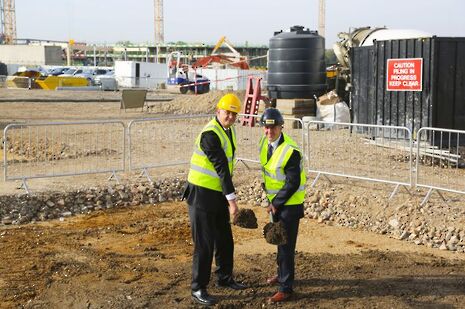Annual financial report shows sharp drop in University net income
Cuts, Brexit, and changes to higher education funding pose long-term concerns for Cambridge finances

The University of Cambridge’s net income fell more than two-thirds in the year 2015–16, according to the University’s annual financial review.
Despite a 4.5 per cent rise in non-investment income, rising expenditure and poorer than expected investment gains meant that the University ended the year with a net income of £112 million, down from £339 million in the year 2014–15.
The report highlights a number of uncertainties which are likely to have a long-term impact on the University’s balance sheet, including the lack of clarity surrounding Britain’s exit from the European Union, and changes to the government’s Higher Education framework.
In particular, the future of the funding received from the European Commission – £62 million in 2015–16, a slight increase on the previous year – has been thrown into doubt as a result of the ongoing Brexit negotiations. The potential loss of direct EU funding, which makes up more than 10 per cent of the University’s £469 million total income from research grants, is a “major concern” facing the University in the coming years, the report states.
The government, which gave £11 million less in funding to Cambridge this year, via the Higher Education Council for England, faces a potential bill of £137 million to the University of Cambridge alone, having promised in August to underwrite all EU funding for research projects until 2020. Nonetheless, continuing cuts to higher education funding are likely to continue to put pressure on the University’s financial position.
While tuition fee income increased £37 million to a total of £263 million in 2015–16, with the prospect of growth due to increases in tuition fees as inflation climbs, and further rises in the number of postgraduate students at the University, the report suggests that “pressures on major items of expenditure including pay, pensions, energy, and construction costs are likely to persist”.
As a result, the University will continue to be dependent on endowments and donations, which this year reached £71 million, in order to meet its “ambitious but necessary” capital expenditure targets, including the completion of the North West Cambridge development, and further building at the Biomedical Campus, New Museums, Old Addenbrooke’s, and West Cambridge sites.
The report describes this year’s income, bringing net assets to a total of £4.36 billion, as “satisfactory”, but notes that operating cash flows are “not sufficient to support our strategic capital programme ambitions”.
A spokesperson for the University told Varsity: “The amount was in line with expectations and budgeting assumptions, with an operating surplus of £65m and £112m added to reserves, but clearly there is uncertainty going forward.
“The University of Cambridge has published its 2015–16 Financial Statements, showing the University group’s financial operating performance over the year was satisfactory, with a small overall surplus after donations and endowments, and a significant surplus from Cambridge Assessment’s activities. Overall the financial position is, as expected, finely balanced with operating cash flows not sufficient to support our strategic capital programme ambitions. The future financial landscape remains challenging and uncertain, and additional funding from philanthropy and other sources will continue to be required. The University is active in diversifying its funding sources to avoid dependence on any single stream.”
The spokesperson emphasised the importance of a long-term perspective: “The University is one of the world’s leading academic institutions and continued investment is key to it remaining competitive on a global stage. This underpins our long-term ability to maintain and develop research funding, attract the best staff and students, and provide research and teaching facilities commensurate with our standing as one of the world’s leading universities”
 Comment / Anti-trans societies won’t make women safer14 November 2025
Comment / Anti-trans societies won’t make women safer14 November 2025 News / Controversial women’s society receives over £13,000 in donations14 November 2025
News / Controversial women’s society receives over £13,000 in donations14 November 2025 News / John’s rakes in £110k in movie moolah14 November 2025
News / John’s rakes in £110k in movie moolah14 November 2025 Comment / Be mindful of non-students in your societies12 November 2025
Comment / Be mindful of non-students in your societies12 November 2025 News / Home Office denied PhD student visa to attend graduation14 November 2025
News / Home Office denied PhD student visa to attend graduation14 November 2025









